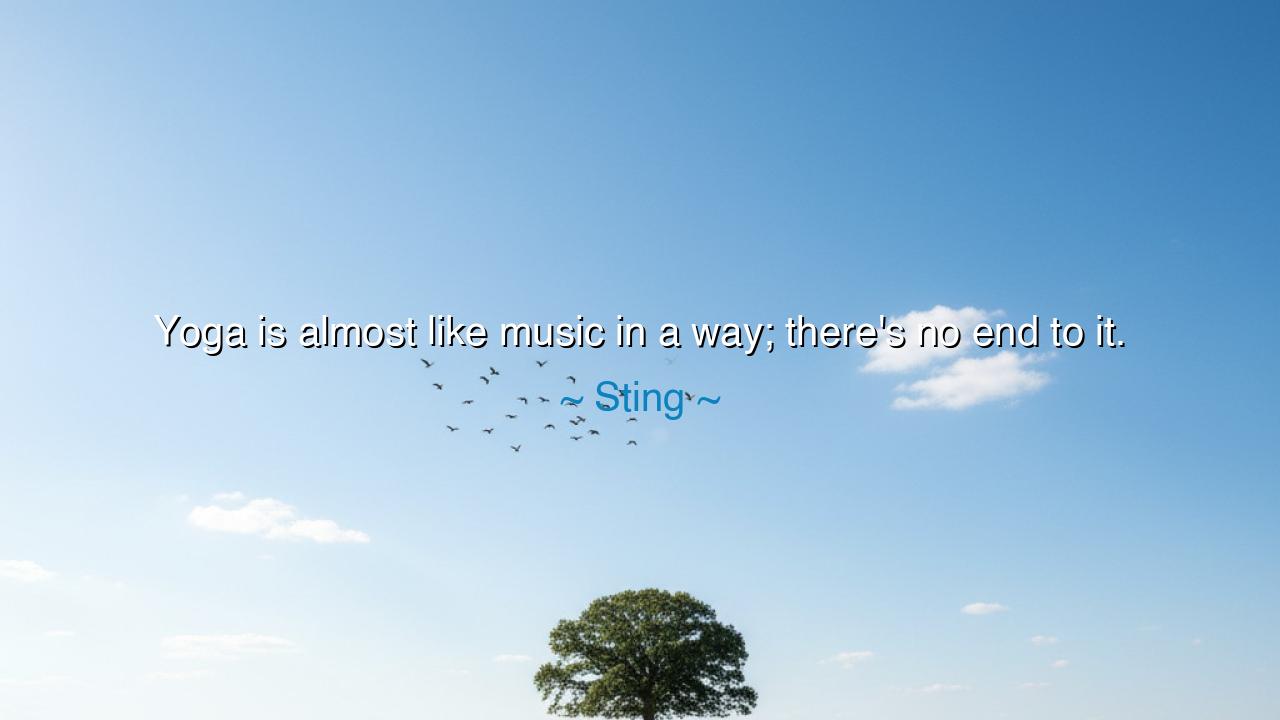
Yoga is almost like music in a way; there's no end to it.






“Yoga is almost like music in a way; there's no end to it.” Thus spoke Sting, the poet-musician whose life found harmony not only in melody but also in the ancient discipline of the body and soul. His words carry the breath of eternity, for both yoga and music are arts without conclusion, rivers that flow endlessly, never reaching a final shore. They are practices not of finishing, but of becoming, where each step, each note, each breath opens into infinite possibility.
The ancients knew this truth well. In the Upanishads, the sages spoke of yoga as a path, not a destination. Just as a raga in Indian music can unfold endlessly, each phrase leading into another without resolution, so too does yoga lead the practitioner into deeper realms of self-knowledge, without ever arriving at a final end. To compare yoga to music is to recognize that both are mirrors of the infinite—one in sound, the other in silence.
Sting himself, a man of the stage and of the inner world, discovered in yoga the same endlessness he found in song. His career, filled with rhythms and harmonies that spanned genres and generations, taught him that music is not bound by completion. A song may end, but the melody lingers in the heart, the rhythm carries forward in the soul, and the listener is transformed beyond the final note. So too with yoga: a posture may finish, a session may close, but the effects ripple endlessly into body, mind, and spirit.
Consider the life of Ravi Shankar, the sitar maestro whose music introduced the East to the West. His ragas were not meant to “end” in the Western sense, but to unfold, like dawn slowly breaking into day. Audiences would sit entranced, carried not to a conclusion but to an eternal unfolding. This is the same spirit of yoga: not to “achieve” a final pose or state, but to experience the journey itself as boundless. In both music and yoga, the path is the destination, and the destination is infinite.
The lesson is profound: in a world that craves endings, achievements, and completion, Sting’s words remind us that the deepest pursuits of the human soul cannot be finished. To walk the path of yoga, or to dwell in the heart of music, is to enter into something that continually expands. There is no mastery that closes the book; there is only growth, refinement, deepening. The true reward is not the finish line, but the endless dance.
O seekers of wisdom, hear this: if you live only for completion, you will miss the joy of the journey. Do not treat yoga as a task to be finished, nor music as a performance to be conquered. Treat them as rivers in which you may bathe daily, as fires whose warmth is never exhausted. In doing so, you will learn to see your own life not as a race with an end, but as a melody that continues beyond measure.
In practice, this means embracing the endlessness of growth. If you are learning, do not hunger for the day you will “know everything”—for that day will never come. If you are practicing yoga, rejoice in the small shifts of breath and posture, for each is part of an infinite unfolding. If you are living, live not for the finish, but for the daily rhythm, the song that carries you forward.
Thus Sting’s words endure: “Yoga is almost like music in a way; there’s no end to it.” In them lies the wisdom of the ancients: that the deepest arts are infinite, and that life itself, if lived with presence, is a melody without end. Let this truth be your comfort, your guide, and your inspiration—that the journey itself is eternity.






AAdministratorAdministrator
Welcome, honored guests. Please leave a comment, we will respond soon